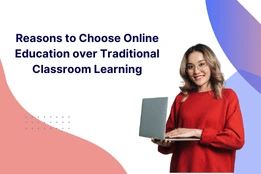Since education cannot simply continue staying within four walls of a classroom with the change in time, this option has emerged in the form of online education. This has brought up an online education vs traditional education debate wherein students from all around the world decide on which option they will go for.

Therefore, to assist you in making such a decision, we will dive into some of the major differences as well as the reasons that would make you consider one over the other. Online learning vs classroom learning has become an important topic of discussion in the education sector.
What is online learning?
Online education is a method of learning through the internet. It operates on digital platforms to execute lectures, assignments, and all other deliveries of educational material. The advent of online education changed the very concept of learning. Now a student can access their lessons from any point, at his or her convenience, not in any way limited by geographical bounds. The debate between e-learning vs classroom learning has sparked discussions, as more students choose digital platforms for education.
Types of online learning
Blended or Hybrid Learning: It is a setup under which the student undergoes both traditional and online learning in an easy manner.
MOOCs: These are forms of university classes or courses that are either free or of very low fees provided by various institutions and accessed by anyone regardless of their locality.
Self-Paced Learning: In this type of learning, students learn at their own pace since they do not have to meet some strict timings.
Specialized Online Degrees and Certifications: It has professional qualifications and certifications that can be done online.
What is Traditional Education?
Traditional education refers to the traditional method of learning, which takes place within a physical classroom. It is typically lecture-centered with face-to-face interaction by the teachers and students; it also follows a fixed schedule and curriculum within a formal setting of schools, colleges, or universities.
Types of Traditional Learning
Lecture-based learning: Classroom scenario where the lecturer gives information, which students passively sit and receive.
One-on-one tutoring: It is personalized instruction by a teacher when one student is trained under close guidance.
Traditional classroom teaching: It is just group learning under a teacher in a class.
Teacher-centered learning: This focuses on teachers or the lecturer as the central source of knowledge, where students are then expected to absorb all the information that he delivers.
Formal Education Institutions: Schools, colleges and universities where students strictly follow a fixed curriculum by certified trainers.
On-Location Training and Workshops: Practical courses conducted on-site to gain some ground-breaking experience in a particular field.
Online learning vs Traditional Education
|
Parameter |
Online Education |
Traditional Education |
|
Flexibility |
Offers flexibility as learners have to sit in a classroom from anywhere and learn at their own pace. |
Relies on strict adherence to a schedule or calendar of attending physically. |
|
Learning Environment |
Facilitates a virtual setting to learn through, and students can attend any comfortable space that is available to them. |
Offers a structured environment with face-to-face learning that most students are comfortable with in such settings. |
|
Learning Material |
All materials become available digitally-the books, video lectures, and even interactive forums. |
Students rely mainly on physical copies of textbooks, handouts, and classroom notes. |
|
Cost Efficiency |
Relatively cheaper, as it is cheaper in terms of tuition fees and no costs incurred for commencing the learning site. |
Generally Costly, since they require them to pay tuition fees, commuting costs, textbooks, Campus amenities, etc. |
|
Technical Issues |
Relies on a stable internet and a computer; difficult for those with little or no technology-based understanding in their communities. |
It is not very dependent on technology, although some technical facilities may be referred to during presentations or as research. |
|
Practical Experience |
There is little scope for practical learning, but they do have virtual simulations and labs available in many fields. |
Offers hands-on experience over the length and breadth of the entire study process through the use of labs, workshops, and even internships. |
|
Method of Communication |
All conversation takes place through discussion boards, e-mails, and video conferencing. |
Discussion can take place face to face; feedback from lecturers and communication with peers is open-minded and vibrant. |
|
Involvement and Development of Social Skills |
The enhancement of social skills is challenging since one rarely communicates face-to-face with fellow students. |
The curriculum fosters interpersonal skills with the help of group activities, presentations, and team-oriented projects. |
|
Learn While Working |
Online learning is perfect for working professionals as one can learn without having to quit his job. |
Campuses usually have full-time programs that demand full commitment and students have to follow the set schedule. |
|
Saves Time for Your Hobbies |
This allows the student ample free time to pursue his hobbies and personal development. |
A rigid schedule which includes daily commutes wastes much of the time, leaving little time for anything else. |
Frequently Asked Questions
What are the advantages of Online Education?
Online education is very flexible and affordable as one can learn from anywhere around the globe, which makes it wonderful for working professionals who have jobs and want to pursue further education.
What are the benefits of Traditional education over online?
Traditional training provides face to face interaction, a strict schedule, and most importantly, on-the-job training usually required in specific fields of specialization.
How do I determine between online and traditional education?
Your choice should, therefore, be guided by career objectives, time availability, learning modality, and personal wallet. If flexibility and self-paced study are what you need and crave, then online studies will surely do the trick. In contrast, if you prefer structured settings with direct experience, then traditional education will be a better fit.
Is Online Education Better than Traditional Education?
Neither of the two modes is better than the other; it depends on your needs. Online education will favour more flexibility and convenience, while traditional education will entertain interpersonal interaction and practical learning.
Conclusion
Online education vs traditional education: both mediums have their merits and demerits. After all, this is the perfect option for those wanting flexibility, affordability, and being able to blend between work and study. On the contrary, while a structured learning environment, face-to-face interaction, and hands-on experience happen during traditional education, it depends on what area the learner wishes to gain knowledge in.





